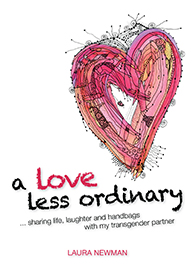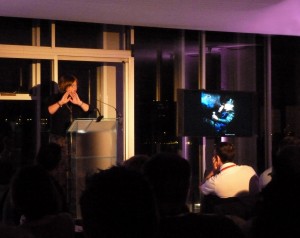Now, let me guess; what is this blog going to be about? Ah! That when you’re transitioning, you can’t travel faster than the speed of light. Sadly true, but no!
OK… I know! Matter and energy can be equated: when something really matters to you, you have boundless energy to achieve it? Again, there’s truth in that, but no.
Alright; it’s just a neat way of speaking about families as quanta? That bonds only have statistical probabilities? Or the fact that you can’t be two things at once – but really you can? Or that the gravity of transitioning is a function of the space you fill and the time it takes?
No. It’s going to be about relating. It’s about people together, how they interact, and some of the reasons for that. I’m not being academic about it, just observing. Just sayin’…
We spend a lot of time talking about relating as families, as friends, as more than friends, as partners.
As far as family are concerned, I have just become a daughter. I love it. My mum may never really come to grips with it, because it may just be too late, too many years of being one thing. A daughter? It’s just relative. I have become a sister too. Again, it has changed the way I feel I relate. I like it; it works. I will always have fathered children, and I have covered this before. It is the most difficult, because I will never be a mother. If possible, I just want to be Andie, who still is a parent, out of the zone of dependency, admiring my children, and simply wanting recognition and respect, and a desire to understand how I was born the way I was. Maybe one day. My family was always relatively small. Now it is relatively smaller.
Family relationships are built to a large extent on roles. Those roles change anyway through phases of life, but this change has not in fact changed roles.
To some friends I have become an honorary sister, which I find lovely, wholly accept and am finding a new richness in. I can go out with another woman, and there really is nothing in it, except the privilege of sisterhood. We can even talk about relationships, or cry, or laugh. Or all three at once. To other friends we just carry on as before, with pronoun changes, maybe a change in what jokes may be acceptably presented to me, but relatively unchanged.
I don’t have a partner, so I can’t say much here. But I know, having expanded into my natural space, how I relate will be different – if it ever happens again.
Something’s cooking
One book I bought when moving into my own place was Delia Smith’s One is Fun. (For those too young or not habitually in the kitchen: recipes for the single person.) Does being single make cooking fun? I actually enjoy cooking now I get to do it. (OK, have to do it.) In fact I like it so much I think I may have discovered pan-sexuality.
And yes, I missed one out from my list: ‘more than friends’.
Many trans* people, on losing the rigidity or binary nature of gender, or at least of the binding of physiology and mind/soul, come to realise the paradoxes of sexuality. If gender is fluid, or non-binary, or detached from the genitals, so may sexuality. It does not mean you don’t know what you are, but you might not know straight away, and you might yet be surprised. For a number of trans* people, sexual intimacy is simply what can ensue with someone you really love. So this woman has a penis? And this man used to have breasts? Is it still intuitively wrong because you are not gay, or not lesbian? It isn’t wrong any more – or rather, it isn’t inappropriate any more, because you let go the matrix and go with your feelings. Love is expressed with what you have got. Hence a steer towards pansexuality. ‘What sex are you really?’ loses its basis in what you see. Love, trust and respect take over from ticking the standard boxes.
The nature of attraction can change for all sorts of reasons: you love a woman more than you used to a man, or vice versa, and find heterosexuality wasn’t as anchored as you thought. You want to express love rather than have the ‘right kind’ of sex. But is doesn’t always change, and there is no scale of predictability. And I do recognise that hormones play a role, either shutting them off or taking them in. But again, not predictably.
It’s still all relative.
And the sense of what you are is still influenced by what people think or say you are. I still have to fully come to terms with the difference between how I feel and what others see. I may get up in the morning and go to work without an ounce of doubt that I am a woman. Once there, a new employee may take one look at me and ask someone else why that woman over there looks a bit different. Isn’t there something about her? Yes. She used to be a man. Frankly, that is what most people will say. Am I a woman? Or just a woman who used to be a man? Is it all just relative? To me, no.
Paradoxes of relativity – and surprise
Trans* relativity can be an enduring discomfort, which is part of why some realise they can never quite be what they want to be, despite all available treatments and surgery. We are who we are, and we are what we are, and some people will never treat those two equally. They may want one, but not the other. For so many, this is the one point at which the marriage vows become very relative too. All that I, am I give? All that I have, I share? Except you didn’t mention the just cause or impediment, and had I known, I would have given, shared, and promised nothing. You broke the contract by being yourself. But what are you? A ‘real’ man? A ‘real’ woman? Or just a woman who used to be a man? Doesn’t it scare you just a little bit when you read your marriage vows, however they were phrased? Aren’t they just impossibly unconditional? What hope of ever exchanging such grand promises to anyone ever again?
If I could change my skeleton for a female one, of course I would. Instead I choose clothes that make the most of a bad job. And as far as I can, I don’t even think about what I ‘used to be’, because that was just the outside. My heart and soul are the same. What I can give is the same. The way I love is the same. Sex? As always, unchanged, I will be loving and generous with what I have, even though what I have will also change. So who wants my love, and does it matter how relative my ‘woman’ is?
As an observer of my transitioning life, I am always as surprised as anyone. The acceptance I have found, from women especially, has at times overwhelmed me. I am one too; welcome to the sorority. Male acceptance? Sometimes cool. But for me, the worst part is the men who having asked, treat me as the woman who used to be a man. Used to be a man, will understand the humour, the suggestion, the sex/gender edginess, the mindset. Sorry guys; it never was my mindset, so don’t put that one on me now either.
And my biggest surprise? That the person who has made me feel most authentic as a woman – is a man.
It’s all a matter of relativity.
 I turned up a scanned article someone helpfully sent me ages ago. It was about Helen Boyd and Betty in the early days. Great! There was Betty doing Helen’s make-up, and then Betty resting her head lovingly on Helen’s shoulder. This was a love less ordinary, surely?
I turned up a scanned article someone helpfully sent me ages ago. It was about Helen Boyd and Betty in the early days. Great! There was Betty doing Helen’s make-up, and then Betty resting her head lovingly on Helen’s shoulder. This was a love less ordinary, surely?